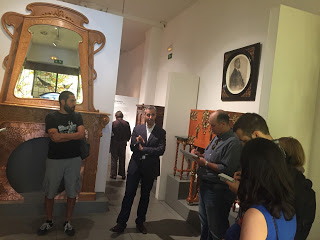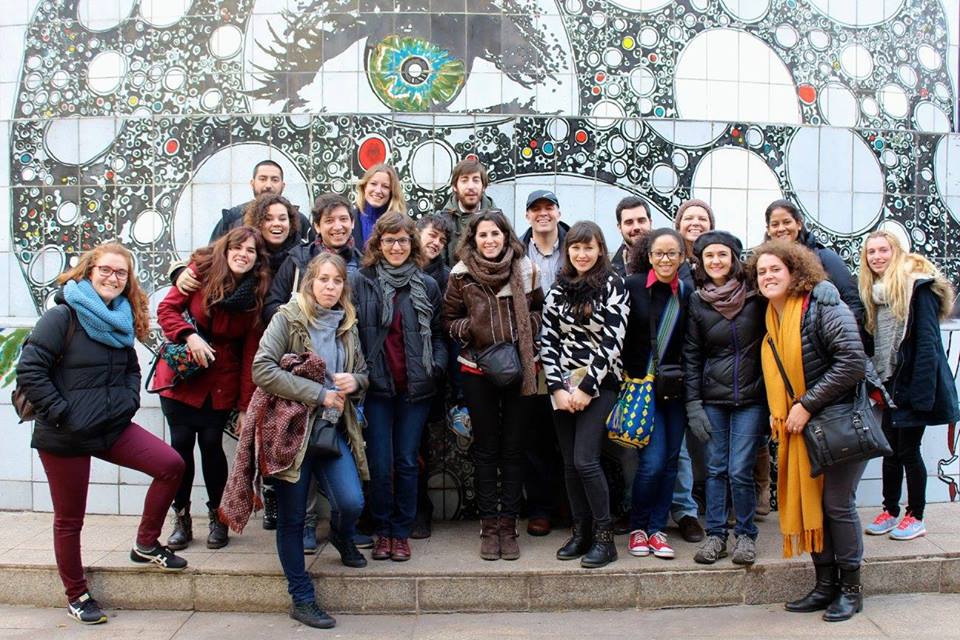- What makes a suitable candidate for the Master’s course?
The background of our students is very diverse: they usually have a university degree in social or human sciences, but we are open to biologists interested in science museums, engineers proposing a cultural start-up, or philologists with a publishing project. Ideal candidates are students with a real interest in cultural management. El perfil ideal correspon a aquells estudiants que estiguin realment interessats en la gestió cultural. We value common sense and social empathy, conceptualising from empirical observation, leadership of human teams, communication skills, and involvement in cultural development of a community or artistic field.
- Is the Master’s degree addressed to international or national students?
No Master’s degree can have a global nature, since the national context and most of the visits and examples given refer to first-hand experience, hence have a local scope. However, this course intends to link national and international experiences. We partially achieve this thanks to the high proportion of foreign students, study visits to a European city, the Erasmus exchange programme, and the teaching staff knowledge about other countries (Europe and America in particular).
- How is the admission test to the Master’s degree?
It is not a knowledge test, as we evaluate organisational and problem-solving skills that are useful for cultural managers. We give a maximum time of 24 hours to answer by e-mail. For this reason, it is important to have a good Internet connection during the test day and 3-4 hours to dedicate to it.
- Is the course very theoretical?
The programme offer a mix of theoretical subjects and applied ones, like funding strategies, design and control of a cultural production, cultural marketing, socio-cultural participation and animation or organizational leadership and human resource management, among others.
- Are there students with different backgrounds?
Yes, in this Master’s course there are many different backgrounds. This makes the course a more enriching experience and students get to know diverse cultural realities, thus opening the horizon beyond national borders.
- I am a foreigner. Will I face adjustment issues while taking a course in Barcelona?
Most students did not face adjustment issues. Over the last ten years, 40% of the students have been foreigners, coming from Canada, France, China, Colombia, Germany, Chile, Ecuador, Italy, Brazil, or South Korea, among others. The environment is very intercultural and inclusive, making the course experience enriching. Barcelona is a cosmopolitan city, where people of different nationalities live together and offers a varied cultural offer.
- Is it a problem if I do not speak Catalan?
No, you only need to understand it. There are classes in Catalan, Spanish and English. You should have reading and comprehension skills in all the three languages, although it is not necessary to speak these languages. No official language qualification is requested, although it is recommended to have some previous preparation. Students can write texts in any of the languages that the professor understands (Catalan, Spanish and English at least). During classes, students can speak in Catalan or Spanish (even in English in some cases). According to the experience of our students, the first weeks you will need time to get used to Catalan, however, our professors will do their best to make you feel the most comfortable.
- Where can I learn Catalan?
The University of Barcelona and the Consorci per a la Normalització Lingüística – a public organisation – offer Catalan introductory courses for foreigners. Many Master’s students attended these courses:
At the same time, it is recommended to follow an online course (Intercat), listen to the radio (Catalunya Ràdio) or watch television in Catalan (TV3 on demand) or do some practice with a native speaker (Borsa intercanvi lingüístic or Voluntariat per la llengua).
- How many credits per year should I take? Is there a maximum number?
You should enrol to a minimum of 40 credits and a maximum of 60 credits per year, of the total of 90 credits of the Master’s course. It is possible to obtain more than 90 credits, if you want to adquire more knowledge or if you have to reach the 300 credits required for PhD admission (students having a degree of 180 credits need to obtain 120 additional credits, that can be obtained by selecting more elective subjects within the Master’s degree).
- Is it possible to enrol both to the professional and research profile formats?
Yes, but you need to enrol in more subjects than the minimum 90 credits required to obtain the diploma of Master in cultural management.
- What is the total cost of the Master’s degree?
Every year, the University slightly modifies the amount, according to the specifications fixed by the Catalan government. Administrative taxes should be added to the official cost of the course.
All economic information regarding the Master’s degree can be asked to the Oficina del Màster i al Doctorat of the Faculty of Economics: omd.eco@.edu
- Is it possible to pay in instalments?
Yes. Normally, there are 2 payment methods:
- Direct debit payment.
- Cash payment.
There are 3 different instalment options:
-
- One-off payment in 7 days.
- 3 instalments.
- 7 instalments.
- What are the economic consequences of obtaining the maximum grades (Matrícula d’Honor)?
Those obtaining a Matrícula d’Honor in the Master’s degree in Cultural Management will receive a 50% discount on the cost of the credits for the next year.
- Can I apply for a scholarship? How?
Yes, all the scholarships for Master’s students of the University of Barcelona can be found on this page:
http://www.ub.edu/web/ub/es/estudis/suport_estudi/beques_ajuts/master/beques_master.html
- Is it possible to transfer credits? How does it work?
Yes, in case you obtain a number of credits equal to or greater than the number of credits of the subject to validate, that has to cover the same topic. In total, it is possible to transfer credits for a maximum number of 12,5. There are specific time periods for credit recognition. If you want to transfer credits, you should give all supporting documentation attesting subject completion to the Master’s coordinator.
- What kind of insurance coverage is required?
When students enrol at the course, they should be covered by an insurance plan. It is recommended to choose the wide coverage option, at a cost of 9 euros. With this insurance plan, students can take part in the tours planned for the subjects “Prospects and analysis of cultural projects I and II” and do an internship or other activities outside University.
- I have been offered a place at the Master’s course for this academic year, but finally I will not be able to attend the course. Is it possible to maintain the place offer for the next year?
No, it is not possible, as every year we receive a great number of applications and all should have the same opportunities. This means that if you have been offered a place but finally you did not enrol in the program, the place offer is not valid for the next year.
- Can I study and work at the same time?
Yes, it is possible to study and work at the same time. However, consider that this Master’s course has a heavy workload.
- Is it possible to perform a professional internship during the course?
Yes, indeed it is part of the programme. Internships are thought not only for students enroled in the professional profile format, but also for the research profile students. The latter can perform internships at research institutions or groups, or at cultural organisations where they want to carry out their final project’s research. Curricular internships can be performed starting from the second semester, in any period or place (for example, during the Erasmus stay abroad).
- Is internship validation possible?
Yes, if you can demonstrate a minimum period of two years working as cultural manager.
- When can I apply to the Erasmus mobility programme with other European universities?
The Erasmus stay can be done during Year 2 of the Master’s degree. It is advisable to do it during the 3rd semester of the Master’s course. We have agreements with several European universities, like, for example: the University of Groningen (Netherlands), the University of Paris IX- Dauphine (France), the University of Jyvaskyla (Finland), the University of Bologna (Italy), the University of Aarhus (Denmark) or the University of Prague (Czech Republic).
- How can I request my diploma?
Upon course completion, you can submit a formal request to the Masters and PhD Office of the Faculty, bringing with you a copy of your ID or passport, after having previously paid the diploma fee.
- Is it easy to find a job upon Master’s course completion?
Upon Master’s course completion you will have more tools and a good overall picture of the cultural sector, thus, you will have more chance to get a job in the field. Nevertheless, future career depends on period and local economic situation, as well as chosen sub-sector. Curricular internships give students a good overview of the current job environment in our field and allow to get first-hand knowledge, provided by professionals of the cultural sector.
- Can I ask for recognition of Master diploma in my home country?
The Master’s degree is part of the European Higher Education system, which automatically recognises the subjects and official diplomas obtained in any country having signed the agreement (not only European Union member states, but also several countries elsewhere in the world). Master diploma recognition in the student’s home country does not depend on the University of Barcelona, however, normally all students willing to have the Master’s degree recognised in their countries have been able to do it, sooner or later.


 https://www.ub.edu/cultural/wp-content/uploads/2016/08/12647271_1017019998354165_7756332221294573578_n.jpg
https://www.ub.edu/cultural/wp-content/uploads/2016/08/12647271_1017019998354165_7756332221294573578_n.jpg 


